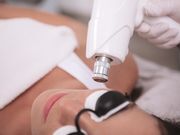By Steven Reinberg HealthDay Reporter
(Health Day)
TUESDAY, Jan. 24, 2023 (HealthDay News) — A cosmetic laser treatment that promises to fade wrinkles, scars, age spots and sun damage may also prevent some skin cancers from returning, a new study suggests. , small study.
The researchers found that in patients who had basal cell or squamous cell skin cancer, non-ablative fractional laser treatment cut the chance of the cancer coming back by about half.
“We actually don’t know why this process has this effect,” said a senior researcher Dr. Matthew Abramdirector of the Laser and Cosmetic Dermatology Center at Massachusetts General Hospital in Boston.
“We need to go into the lab and try to understand why this is happening. There are theories about whether or not the treatment causes a change in your immune function and your skin, but we don’t have evidence for that,” he said.
“Fractional lasers treat a portion of the skin and leave most of the skin untreated,” Avram said. “But even though we’re only treating one part of the skin, the whole skin benefits from it.”
Basal cell and squamous cell skin cancers are the most common type of skin cancer and are usually curable when diagnosed early.
For the study, Avram’s team looked at the records of patients who had basal cell or squamous cell cancer. These patients typically have a 35% risk of developing a new cancer within three years and a 50% risk of recurrence within five years.
Forty-three patients later underwent laser treatment, while 52 did not.
Among patients treated with laser, 21% developed new basal or squamous cell cancers of the face over a follow-up of more than six years. Among untreated patients, 40 percent developed new cancers, the researchers found.
After adjusting for age, sex, and skin type, untreated patients were almost three times more likely to develop new cancers than patients who received laser treatment.
Among treated patients who developed skin cancer again, relapse took longer than among untreated patients, the researchers noted.
Despite these findings, Avram advises against getting this laser treatment in hopes of preventing skin cancer or skin cancer from coming back.
“While I am not advocating that all patients should receive fractional laser treatment, in case you are considering a cosmetic treatment, it is good to know that in addition to the cosmetic benefits, you will actually get the benefits of what appears to be a reduced incidence of the two most common forms of skin cancer,” he said.
The most important thing to do is to check your skin for any new growths and see a board-certified dermatologist to examine you even more closely for any precancerous spots or skin cancers, Avram said.
“Also, use sunscreen, avoid the sun, wear hats, all that protective behavior, those things don’t change, and I don’t recommend doing anything more than that. I wouldn’t recommend the public go out and do this procedure. process is expensive. There’s downtime. We don’t have to,” he said.
Dr. Richard Carvajal directs medical oncology at Northwell Health Cancer Institute in Lake Success, NY “Non-melanoma skin cancers such as basal cell carcinoma and squamous cell carcinoma are by far the most commonly diagnosed cancers, with over 5 million cases diagnosed in the US each year. ” he said.
Although the risk of death from these cancers is low, the cost and impact on patients’ quality of life are significant, and strategies are needed to prevent or reduce the risk of developing skin cancer, Carvajal said.
“Using a laser treatment called non-ablative fractional laser therapy may be one way to achieve this goal,” he said. “These results, while certainly interesting, require confirmation in additional studies.”
SOURCES: Mathew Avram, MD, director, Laser & Cosmetic Dermatology Center, Massachusetts General Hospital, Boston. Richard Carvajal, MD, associate chief medical officer, director, medical oncology, Northwell Health Cancer Institute, Lake Success, New York. Dermatological SurgeryDecember 6, 2022
Copyright © 2023 Health Day. All rights reserved.

